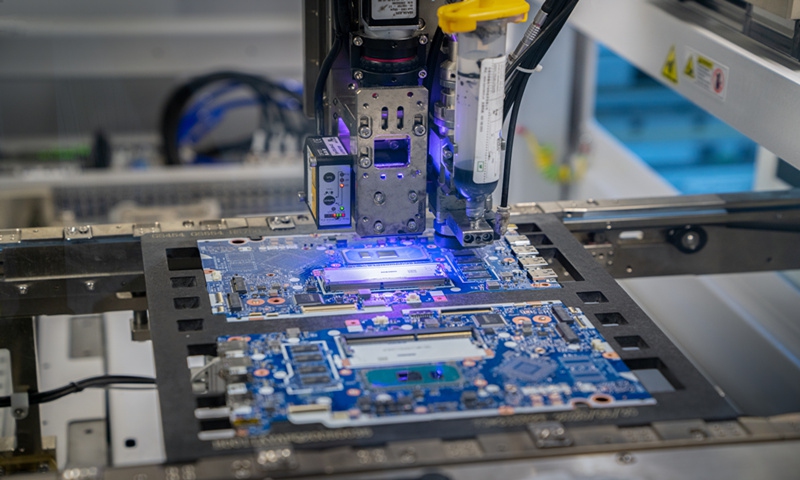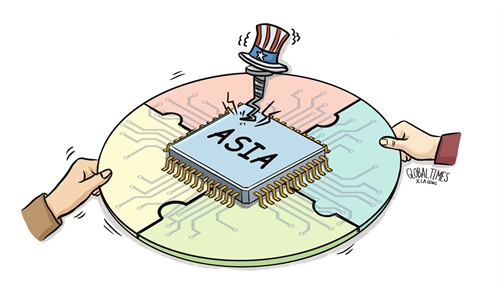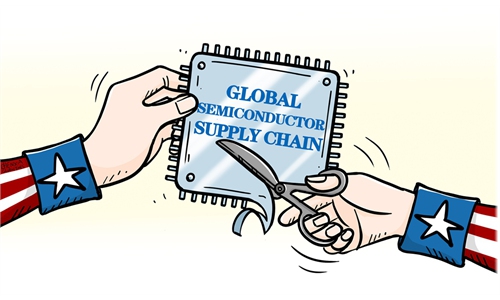
A chip manufacture machine Photo: VCG
Chinese chip industry group and trade council on Friday lodged firm opposition to Japan’s proposed export restrictions on chip manufacturing equipment, vowing to call on the Chinese government to take resolute countermeasures.
In a statement posted on its website on Friday night, China Semiconductor Industry Association (CSIA) said the export control measure by the Japanese government "would bring even greater uncertainty to the ecosystem of the global semiconductor industry and the CSIA opposes the act of interfering with global trade liberalization, distorting the balance of supply and demand."
On March 31, the Japanese government said it plans to expand the scope of export controls for semiconductor manufacturing equipment to cover some 23 types of semiconductor manufacturing equipment. The move is seen as the country aligning itself with US technology curbs on China.
It is hoped that the Japanese government would adhere to the principles of free trade and not abuse export control measures to harm the cooperative relationship between the semiconductor industries of China and Japan, China's chip trade group said.
The scope of controlled items is overly broad and far exceeds the internationally accepted list of controlled items, causing great hardship to the enterprises concerned, the CSIA said.
The interests of related Japanese companies could suffer significantly as a result of the control measures, leading to less profit to support their R&D innovation and technology iteration, undermining the competitiveness of Japanese companies in the international market, according to the CSIA statement.
The semiconductor industries in China and Japan are interdependent and mutually reinforcing. China enjoys advantages in upstream raw material products, components and packaging; as the largest semiconductor market, it has abundant semiconductor product application scenarios; while Japan is superior in semiconductor equipment, materials, certain semiconductor products and hardware integration, the CSIA said, adding that the two sides have built solid collaboration and mutual trust between the industries.
If the Japanese government is determined to jeopardize the well-established cooperative relationship between the Chinese and Japanese semiconductor industries, the CSIA is committed to safeguarding the legitimate rights and interests of its 900 members and shall call on the Chinese government to take resolute countermeasures.
In a statement posted by the China Council for the Promotion of International Trade (CCPIT) on Friday, it said it firmly opposes the Japanese government's export control plan.
The scope of Japan's proposed revision of export control measures is broad, whose provisions are quite unclear and opaque.
The items have already exceeded the usual controlling range, in which a lot of civilian-purpose items are included, even items shall not be controlled as explicitly provided in Wassenaar Arrangement, such scope has be far beyond the scope made by international norms and other countries, the CCPIT said.
The proposed revision is targeting at semiconductor manufacturing equipment, which cannot be used for military purposes per se, while its products generally are used for consumer electronics, there is no military elements involved, it said.
Under the name of so-called "existence of risks of hindering the maintenance of international security and peace", Japan is actually taking discriminatory measures against China's semiconductor industry, which obviously violates international rules, the CCPIT said.
If the proposed plan comes into effect, the economic and technological cooperation and exchanges in the semiconductor field between China and Japan shall be shadowed by significant adverse impact, which not only will lead to losses to the economic interests of entities in marketplace between China and Japan, but also will disrupt the global semiconductor industry supply chain, further reduce the overall potential of competition and development in the industry, it said.
The council said it has raised its opposition to Japan, calling on the Japanese government to consider the control measures with discretion, and make a decision that is in line with the common interests of the semiconductor industry between China and Japan.



